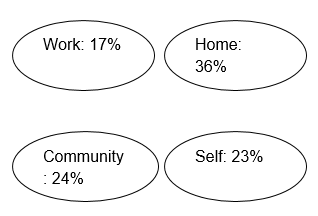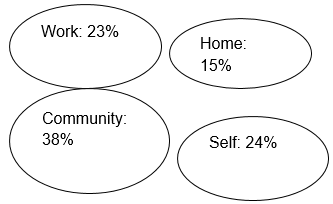Abraham Maslow’s Theory
Definition of Happiness
I would define happiness as the ability to do the things that I am most interested in. This definition of happiness is closely associated with the idea of goals and aspirations, since reaching them is what will make me content. In addition, to be happy I need to become a qualified professional and find a good position in the corporate world. Every person strives to be independent, and for me, the possibility of being self-sufficient is one of the dimensions of happiness. Thus, I could sum up my definition of contentment as the opportunity to do what I want, be successful and prosperous, and achieve my purpose in life.
Bandwidth Analysis
The following sections represent the bandwidth analysis of the remaining four levels of Maslow’s pyramid.
Physiological Needs
The “Good Enough” Level
At this point, my most basic physiological needs are having a place to live and also the ability to provide food for myself. Another need is to have enough rest from my studies and work. Similarly, the third need at this level is a regular sleep pattern.
The “Aspiration” Level
Needs at this level include being able to buy my own house or flat, and having seven to ten days of vacation annually. I would also like to have a house in the forest where I could go with my friends to spend a nice weekend occasionally.
The “Where I Am” Level
I am currently below the “good enough” level, as I share an apartment with several friends, and do not usually get enough sleep.
Safety Needs
The “Good Enough” Level
The major need here is to be safe from criminal activity. Another need is to have stable work and good grades. Finally, there is a need to be strong physically to protect myself or my friends in case of emergency.
The “Aspiration” Level
The first need at this level is having a house with a strong security system. Another requirement is the possibility of hiring a lawyer or a bodyguard (depending on the situation). Finally, my house should be protected from natural disasters such as hurricanes or earthquakes.
The “Where I Am” Level
Currently, I am at the “good enough” level: I am in good physical shape, and I have stability at university and work.
Belongingness and Love Needs
The “Good Enough” Level
The major needs at this level are being able to visit my family regularly and knowing that I can rely on their support. Also, I need to be a member of social groups (through sports, studies, or extracurricular activities) to feel that I belong somewhere. Finally, I need to have at least one good friend with whom I can talk about anything and know that he or she will never betray me.
The “Aspiration” Level
The major need here is starting a family of my own, with a loving partner and children. Another need is belonging to some club such as golf or cricket, where only specific people are allowed. In addition, I would like to be a person on whom others could rely in difficult situations.
The “Where I Am” Level
I feel that I am currently below the “good enough” level.
Esteem Needs
The “Good Enough” Level
The first need is to feel that I am doing well at my work and university. Secondly, there is a need to not be rejected by other people. The third need is an aspiration for the better and the realization that I can succeed in whatever I start.
The “Aspiration” Level
A significant need is becoming the best student in my course. A second need is reaching a high level in sports (specifically cricket). The third one is becoming a role model for younger students.
The “Where I Am” Level
Currently, I am the at “good enough” level: I am on good terms with others, and I succeed in my studies.
Stew Friedman’s Theory
Friedman’s Four Circles: The Present Balance

At the moment, my physiological and safety needs are predominantly satisfied in such circles as “home,” “work,” and “self.” Since I rent an apartment, I have a place to sleep and relax. Because I have a part-time job, I can afford to pay rent, buy food, and be generally protected from outside attacks. The need of belongingness and love is satisfied in the circles “home” and “community.” Here, I consider my family and people with whom I communicate during classes and work as the crucial participants. Esteem needs are largely focused in the circle “work.”
Friedman’s Four Circles: The Ideal Balance

In order to gain a better satisfaction of my physiological and safety needs, I should spend more time at work. This way, I could receive more money and afford better rest. Increasing the “work” circle will also promote my esteem needs. Apart from this circle, esteem needs can be enhanced through spending more time in the community. At the moment, I am wasting some time on gadgets and other unnecessary things. However, I realize that I should spend more time and efforts on valuable activities such as sports or self-education. Belongingness and love needs are closely associated with the “community” circle. To find friends and a loving partner, it is necessary to spend more time with people by getting to know them or sharing some interests.
The Discussion on How Balanced I Am
To my regret, I must admit that I do not have a good “walk the talk” balance. I get distracted too often, which I realize is a very bad habit. There are also times when I am not doing anything just because I cannot come up with any ideas about what to do. Sometimes I lack a consciousness of time management when I am doing something exciting. For instance, I may spend too much time playing my favorite sports and forget about an important assignment at the university. I believe that I should become a better manager of my own time.
The Ways of Moving to the Desired Balance
To gain the desired balance, I am going to use Friedman’s three strategies:
- Be real: I will make my “walk and talk” balance more positive and will act reasonably. I need to demonstrate myself as a reliable individual in all spheres.
- Be whole: I need to create strict limits on my leisure activities and focus on my future career since I want to become a successful manager.
- Be creative: I need to dedicate more efforts to all my endeavors since I am the only one who can lead myself to success. I should leave my comfort zone and pay more attention to the things that may be not easy but are rather crucial.